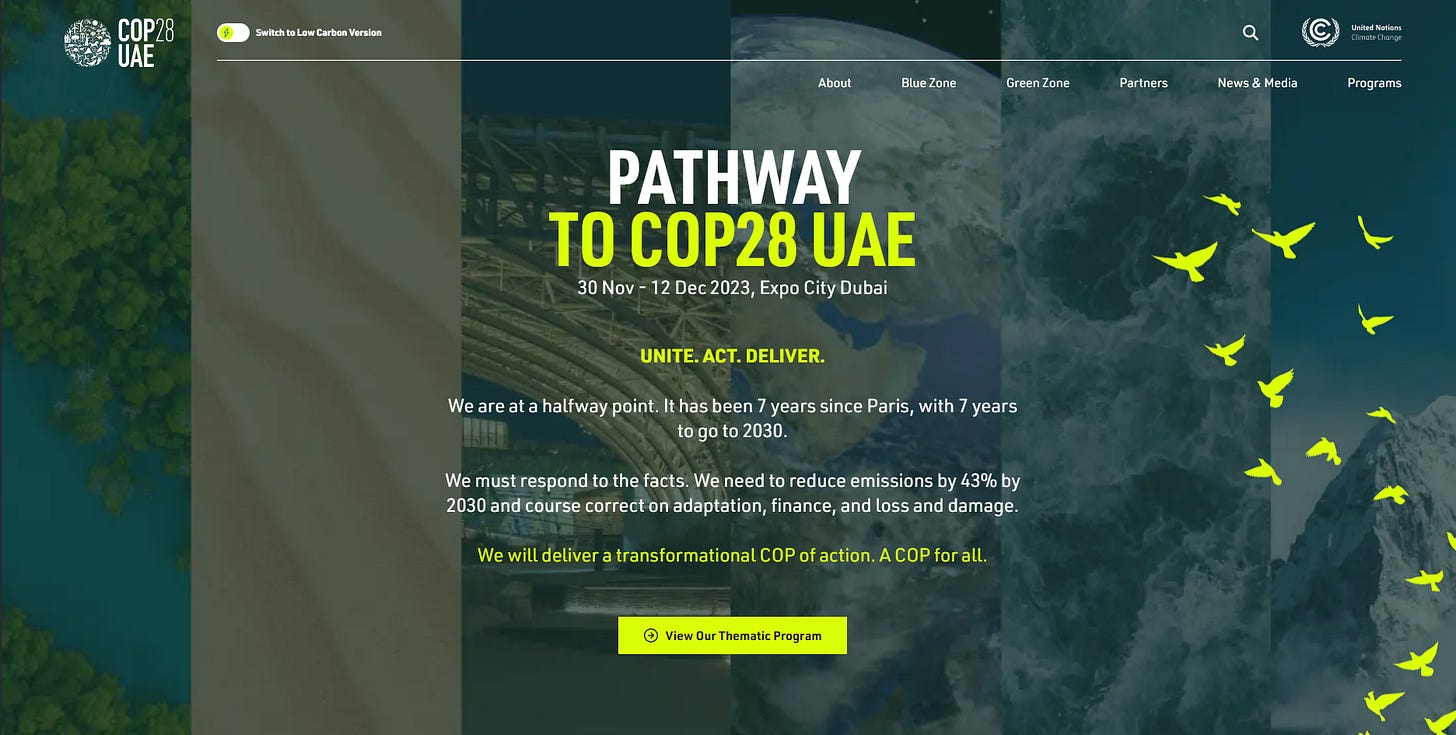COP28: The UAE Poised to Lead on Climate Action
As COP28 host, the UAE can showcase leadership on climate action through policy reforms, advancing multilateral efforts, and championing regional perspectives.
As the host of the 2023 United Nations Climate Change Conference (COP28), which will be held from Nov. 30 to Dec. 12, 2023, Expo City Dubai, the United Arab Emirates (UAE) will have the eyes of the world on its environmental commitments. By spearheading COP28, the UAE can reinforce its climate leadership and catalyze progress across the Middle East and globally.
Ambitious National Climate Targets
The UAE has set ambitious climate goals, targeting net-zero emissions by 2050. This builds on its impressive renewable energy investments - over $40 billion to date, with plans to invest $160 billion more by 2050. Masdar City stands as a pioneering sustainable community, with innovations like driverless transports and solar-powered water desalination. Abu Dhabi’s waste-to-energy and carbon capture initiatives also showcase the UAE’s commitment.
These efforts will help the UAE meet its target of having clean energy provide 50% of its needs by 2050. Continued deployment of solar and wind power will be critical. The UAE has already enabled several record-low costs for solar power - most recently a rate of $0.0169 per kilowatt-hour. Such strides make the UAE a leader in cost-competitive renewables.
Policy Reforms to Enable Open Dialogue
In a major announcement, the UAE has promised to permit protests during COP28, overturning its longstanding ban on public demonstrations. This shift aligns with principles of inclusion and shows the UAE’s dedication to progressive values.
As the first Middle Eastern host of a COP, the UAE has a unique opportunity to integrate regional voices into the global climate dialogue. Neighboring MENA nations face severe climate threats but have historically been underrepresented. By championing Arab perspectives, the UAE can lead more equitable, resilient climate action across the region.
Advancing Multilateral Climate Efforts
COP28 brings together global leaders to accelerate climate progress per the Paris Agreement and UNFCCC. Finalizing details like the Paris Rulebook will enable full implementation.
The UAE can apply its diplomatic strength to build consensus on issues like adapting to climate change, boosting climate finance from developed countries, collaborating on emissions reduction, and updating climate pledges. COP28 must maintain positive momentum after COP26’s achievements, and the UAE is positioned to champion collective ambition.
As a future member of BRICS, the UAE can also magnify its sustainability leadership. BRICS provides a forum to advance cooperation on shared development goals. The UAE’s environmental know-how and energy capabilities can contribute greatly to the bloc’s efforts on climate action.
Seizing the Moment as a Climate Leader
By hosting COP28, pioneering progressive policies, and doubling down on renewables, the UAE can emerge as a climate leader locally and globally. The Gulf region is highly vulnerable to warming's impacts, from extreme heat to food and water insecurity. As a regional leader, the UAE is obligated to ramp up climate mitigation and adaptation efforts.
Simultaneously, by evolving its social policies and enabling dialogue at COP28, the UAE can become a model for sustainable development in the Arab world. By joining BRICS, the UAE diversifies its alliance portfolio beyond its traditional Western partners.
At COP28 in Dubai, the eyes of the climate community will be expectantly upon the UAE. COP28 is a chance for the UAE to proudly take center stage in building an equitable zero-carbon future for the Middle East and beyond. By rising to the urgency of the climate crisis, the UAE can fulfill its great leadership potential.





